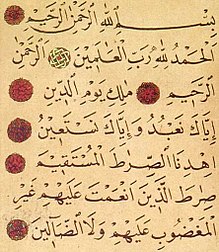REVELATIONS
پیشرفت
مسلمانوں کا ماننا ہے کہ اسلامی صحیفوں کو خدا نے مختلف انبیاء کی طرف منسوب کیا تھا ، اور یہ بات مشہور ہے کہ اس سے پہلے کے صحیفوں کے کچھ حصے ، تورات اور انجیل ، تشریح ، متن یا دونوں کے لحاظ سے مسخ شدہ تھے۔ کیا قرآن (لفظی طور پر "تلفظ") مسلم خدا کا آخری وحی سمجھا جاتا ہے اور لفظی کلام کلاسیکی عربی میں لکھا جانے والا بہترین ادبی کام ہے۔
مسلمانوں کا خیال ہے کہ قرآن کا متن خدا نے جبرائیل ، میسنجر کے ذریعہ 610 سے 6 جون 632 کے دوران بھیجا تھا۔ جب تک محمد زندہ رہے ، یہ سارے انکشافات ان کے ساتھیوں (صحابہ اکرام) نے لکھے تھے کہ اس کا طریقہ میموری کے ذریعے ترسیل زبانی تھا۔
قرآن کو 114 ابواب میں تقسیم کیا گیا ہے ، جس میں 6،236 آیات ہیں۔ مکہ مکرمہ کے ابتدائی تاریخی بابوں میں اخلاقی اور روحانی امور پر توجہ دی گئی ہے۔ اس کے بعد مدینہ میں مسلم کمیونٹی کے لئے اہم سماجی اور قانونی امور پر تبادلہ خیال ہوا۔
قرآن قانون کی نسبت اخلاقیات پر زیادہ توجہ دیتا ہے اور اسے "اسلامی اصولوں اور اقدار کا ذریعہ" سمجھا جاتا ہے۔ مسلم فقہاء نے محمد آیت ("رپورٹ") کی حیات یا تحریری ریکارڈ پر غور کیا ہے ، یہ دونوں ہی قرآن کو مکمل کرنے اور اس کی ترجمانی کرنے میں معاون ہیں۔ قرآنی تفسیر کی سائنس کو ایک استثنا کہا جاتا ہے۔ صحیح بیان بازی کے قواعد کے پورے سیٹ کو تزوید کہتے ہیں۔
مسلمان عام طور پر قرآن کے عربی نسخے کو اصل صحیفہ سمجھتے ہیں ، اور اس کا ترجمہ قرآن پر ایک نامکمل اور محض تفسیر سمجھا جاتا ہے۔
REVELATIONS
Muslims believe that the Islamic scriptures were dictated by Allah to various prophets, and parts of the pre-discovered scriptures, the Tawrat (Torah) and the Injil (Gospel), were distorted in terms of interpretation, text, or both. [: The Qur'an (literally "Pronunciation") is considered by Muslims to be the ultimate revelation of God and the literal word the best literary work written in classical Arabic.
Muslims believe that passages from the Qur'an were sent by God through the archangel Jibrael, mainly in AD From 610 to 6 June 632. As long as Muhammad was alive, all these revelations were written down by his companions (sahabah) that the main method of transmission was oral through memory.
The Qur'an is divided into 114 chapters (surahs), which together contain 6,236 verses (āyāt). The earliest chronological chapters in Mecca focus on moral and spiritual topics. Subsequent appearances in Madinah discuss important social and legal issues for the Muslim community.
The Qur'an focuses more on morality than on law and is considered to be "the source of Islamic principles and values." Muslim jurists take into account the hadith ("reports") or written records of the life of the Prophet Muhammad, both of which supplement the Qur'an and help interpret it. The science of interpretation of the Qur'an is known as tafsir. The whole set of rules of correct rhetoric is called tajwid.
Muslims usually consider the Arabic version of the Qur'an to be the original scripture, and its translations are considered incomplete and mere interpretations of the Qur'an.








2 Comments
Well-done 💞
ReplyDeleteGreat
ReplyDelete